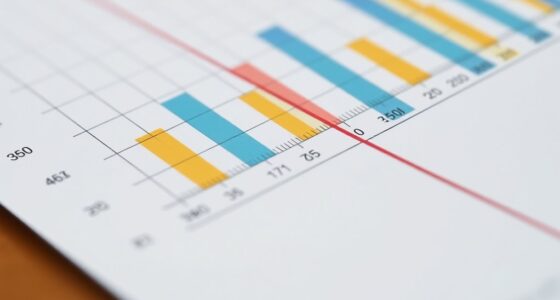Mastering algebra basics is essential for your success in statistics because it helps you smoothly manipulate formulas, solve equations, and interpret data correctly. When you understand algebra, you can handle complex models and analyze relationships between variables with confidence. This skill makes it easier to work through statistical tasks and communicate results precisely. Keep going, and you’ll discover how strengthened algebra skills can boost your statistical understanding even more.
Key Takeaways
- Developing strong algebra skills simplifies solving equations and manipulating formulas essential for statistical analysis.
- Understanding how to isolate variables enhances the ability to interpret data relationships and compute statistical measures.
- Practicing equation-solving techniques builds confidence and fluency in tackling complex statistical problems.
- Mastering algebraic operations facilitates adapting formulas to different scenarios and models in statistics.
- A solid foundation in algebra improves data interpretation, prediction, and effective communication of statistical results.

Are you ready to open the foundational skills of algebra? If you’re aiming to succeed in statistics, mastering these basics is essential. Algebra forms the backbone of many statistical concepts, and understanding how to solve equations and manipulate formulas will make complex problems much more manageable. When you start tackling algebra, you’re essentially learning how to isolate variables and work through relationships between different quantities, which is vital in analyzing data and drawing conclusions.
Solving equations is at the heart of algebra. Think of an equation as a balance scale, where both sides must be equal. Your goal is to find the value of the unknown variable that makes that balance true. To do this, you need to learn how to perform operations that keep the equation balanced, like adding, subtracting, multiplying, or dividing both sides by the same number. This process requires precision and logical thinking. For example, if you see an equation like 3x + 5 = 20, you’ll subtract 5 from both sides to isolate the term with the variable. Then, you divide both sides by 3 to find the value of x. This skill is fundamental because it allows you to solve for unknowns, a common task in statistical analysis, whether you’re calculating probabilities, averages, or regressions.
Solving equations balances both sides to find unknowns, a key skill in statistical analysis and data interpretation.
Manipulating formulas is another crucial skill. In statistics, you’ll often encounter formulas that relate different variables—like the mean, standard deviation, or probability formulas. Being able to rearrange these formulas helps you solve for specific variables based on the data you have. For instance, if you have the formula for the variance in terms of the standard deviation, you should be able to manipulate it to find the standard deviation when given the variance. This might involve algebraic steps like expanding, factoring, or isolating a particular term. The key is to understand how each part of the formula relates to the others and to practice rearranging it efficiently. Developing a strong foundation in algebraic skills also enhances your ability to interpret complex statistical models and results accurately. The more comfortable you become with manipulating formulas, the easier it will be to adapt statistical formulas to different scenarios, making your data analysis more flexible and accurate.
In essence, developing your skills in solving equations and manipulating formulas is about building confidence and fluency in handling mathematical relationships. These skills are tools that enable you to break down complex data problems into manageable steps. As you practice, you’ll find yourself more equipped to interpret statistical results, make predictions, and communicate findings clearly. Mastering these algebraic fundamentals unlocks a deeper understanding of statistics, empowering you to analyze data with precision and confidence.
Frequently Asked Questions
How Does Algebra Directly Influence Statistical Data Analysis?
You use algebra directly in statistical data analysis through algebraic equations and variable manipulation. When analyzing data, you set up equations to model relationships, solve for unknowns, and interpret results. Manipulating variables helps you understand how changes impact outcomes, which is essential in hypotheses testing and regression analysis. Mastering these algebra skills allows you to handle complex data sets more efficiently and draw accurate conclusions, improving your overall statistical insights.
What Are Common Algebra Mistakes in Statistical Calculations?
Algebra misconceptions often lead to calculation errors in statistical work. You might mistakenly distribute terms incorrectly or confuse variables with constants, resulting in flawed results. Common mistakes include misapplying order of operations, omitting parentheses, or mishandling negative signs. To avoid these calculation errors, double-check your steps and guarantee you understand the algebraic principles. Accurate algebra is vital for reliable statistical analysis and sound conclusions.
Which Algebra Topics Are Most Critical for Statistical Success?
You need to focus on solving equations and manipulating formulas, as these are critical algebra topics for statistical success. When you master solving equations, you can accurately find unknown values, and manipulating formulas helps you rearrange data and models effectively. These skills enable you to interpret statistical results correctly and perform calculations efficiently, making them essential for analyzing data, understanding relationships, and drawing meaningful conclusions in your statistical work.
How Can Algebra Skills Be Improved for Statistics Students?
Think of algebra skills as the keys to unlocking statistical mysteries. To improve, you should dedicate time to algebra practice regularly, making concepts second nature. Incorporate visual learning by using graphs and diagrams to see relationships clearly. This approach makes abstract ideas tangible, boosting your confidence and comprehension. Consistent practice and visual aids turn algebra into an accessible tool, helping you excel in statistics with ease and clarity.
Are Advanced Algebra Concepts Necessary for Basic Statistical Methods?
Advanced algebra concepts aren’t necessary for basic statistical methods, but strong Algebra prerequisites help you understand core ideas. You don’t need to solve complex equations regularly; instead, focus on foundational skills like manipulating formulas and understanding variables. These basics support your grasp of probability, data analysis, and descriptive statistics. Building a solid algebra foundation guarantees you can confidently interpret statistical results without getting bogged down in complex equations.
Conclusion
By mastering algebra basics, you set a solid foundation for success in statistics. Remember, understanding how to manipulate formulas and solve for variables makes analyzing data much easier. For example, did you know that over 60% of data analysts find algebra skills vital for interpreting trends? So, keep practicing those equations, and you’ll build confidence to tackle even the most complex statistical problems with ease. Your future in data analysis starts with these essential algebra skills!










